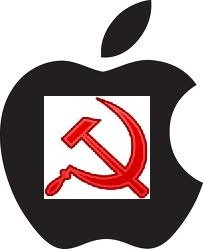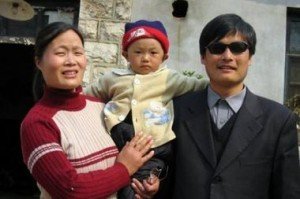Forbidden Fruit? Apple Challenged on China Oppression of Workers
What has happened to women at Apple factories when they have been found to be pregnant without a birth permit. Have they been referred for a forced abortion or involuntary sterilization?

The following article was written By Sara Forden and Adam Satariano from Bloomberg and is submitted by China Aid Association:
Chen Guangcheng, the Chinese dissident whose flight to the U.S. in April roiled U.S.-China  relations, said iPhone-maker Apple Inc. (AAPL) should take a more outspoken role criticizing China for its one-child policy.
relations, said iPhone-maker Apple Inc. (AAPL) should take a more outspoken role criticizing China for its one-child policy.
Apple, which hires manufacturers to assemble products such as the iPhone and iPad in China, can help stop forced abortions and other coercive population control measures, Chen said in an interview this week. The blind human-rights activist is betting that Apple’s presence in China and the popularity of its products there will help draw attention to the issue.
“Apple in China should take a very active role,” Chen said. “There’s a huge social responsibility for these international corporations like Apple.”
This is the first time since arriving in the U.S. that the civil rights activist is speaking against his country’s forced birth control policy, the issue that led to his arrest and jail term in China. Chen received a fellowship to study at New York University after seeking help at the U.S. embassy in Beijing just as high-level talks between the two countries got under way in April.
Chen and other China human-rights advocates are seeking a meeting with Apple Chief Executive Officer Tim Cook to discuss their concerns. They sent a letter to Cook last week asking Apple to adopt measures to end coercive family planning practices in its factories. The proposals included prohibiting access to factories for government family-planning officials and refusing to report women who are pregnant without birth permits. The group also wants other companies, including Cisco Systems Inc. (CSCO), to urge the Chinese government to drop its policy.
Responsibility Report
Introduced in the late 1970s and made mandatory in 1980, China’s one-child policy restricts married couples to having one child in order to control population growth in the country of 1.3 billion.
Apple said in its most recent annual corporate responsibility report that 24 facilities it audited conducted pregnancy tests of female workers and that 56 didn’t have policies and procedures that prohibit discriminatory practices based on pregnancy. Apple said it classified these practices as discrimination, even if permitted by local law, and that the suppliers had stopped the screenings. Apple has said it will stop doing business with suppliers who can’t meet its code of conduct.
Apple relies on Foxconn Technology Group, Hon Hai Precision Industry Co. (2317) and others to build its products.
Broader Action
Steve Dowling, a spokesman for Apple, declined to comment beyond information provided in the company’s corporate- responsibility report, where it says it considers conducting pregnancy tests discriminatory.
Chen and his group didn’t provide any evidence that Apple has been tied to forced abortions or other coercive birth control measures. John Earnhardt, a spokesman for Cisco, didn’t respond to a call seeking comment on Chen’s assertions.
Geng Shuang and Gao Yuan, spokesmen for the Chinese embassy in Washington, didn’t respond to two e-mails and a phone call seeking comment. After more than three decades of strict birth control, China’s Communist party is tolerating debate on the policy, as it risks restraining economic growth as the nation ages and the labor force shrinks. However, in his annual report to lawmakers in March, Premier Wen Jiabao said China will continue to keep its birth rate low.
“As a matter of U.S. policy, any coercive measures, including forced abortion, we deplore,” said Assistant Secretary of State Michael Posner, who oversees democracy, human rights and labor issues for the State Department, during a July 25 briefing on the 17th U.S.-China Human Rights Dialogue. Posner said the U.S. would continue to raise the issue when asked about China’s one-child policy by reporters.
Role Model
Chen and his group said they aren’t trying to single out Apple and instead see the company as a potential leader on this issue. Because of its size and appeal among consumers, Apple has a greater responsibility to act, he said.
“Apple is in a unique position to take a leadership role in standing up against coercive family planning in China,” Chen and the other activists wrote in the letter to Apple’s CEO.
Apple is being targeted first by Chen and fellow activists because it’s the leading company in technology and the world’s largest company by market value, said Andrew Duncan, a film producer and human rights advocate. Duncan is working with Chen, along with Bob Fu, the president of China Aid, and Reggie Littlejohn, who operates Womens Rights Without Frontiers.
Latest Challenge
“Give the voiceless a voice — that’s what we’re asking Apple to do,” said Duncan, a former private-equity executive. “Apple is the leader of corporate America.”
Chen, a self-taught lawyer and prominent opponent of forced abortions under China’s one-child policy, praised Google Inc. (GOOG) for shutting down its China website in 2010 after the operator of the world’s largest search engine said it would no longer filter results to comply with Chinese regulations to self-censor content.
“The bold step taken by Google showed tremendous courage and had impact on China,” Chen said.
Chen’s letter is the latest challenge to Apple’s manufacturing operations in China, which has been a source of criticism, particularly after at least 10 suicides at a Foxconn factory in 2010. China Labor Watch has accused Apple of enabling excessive overtime, poor pay and unsafe working environments.
Building Electronics
In response, Apple in January partnered with the Fair Labor Association to conduct independent audits of facilities where its products are made. The Fair Labor Association said last month that Foxconn had cut working hours and improved safety at a faster pace than had been scheduled in its agreement with the group. Cook also visited China this year, where he toured factories and met with government officials.
Apple isn’t alone in using manufacturers such as Foxconn in China to build some of the world’s leading consumer electronics. Samsung Electronics Co. (005930), Microsoft Corp. (MSFT), Dell Inc. (DELL) and Hewlett- Packard Co. (HPQ) also use a network of suppliers in China to manufacture its devices.
Last month, Samsung was accused by China Labor Watch of using underage workers at a Chinese assembler. Samsung said it didn’t find underage workers at the facility.
“It is totally unacceptable for these corporations to just concentrate on the financial benefit,” Chen said. “Corporations are made of human beings and we all have a responsibility to take a moral and conscious stand.”
_______________
Reggie Littlejohn, President of Women’s Rights Without Frontiers, has joined forces with blind activist Chen Guangcheng, human rights activist Andrew Duncan, and China Aid President Bob Fu, in sending an August 30, 2012 letter to Apple President Tim Cook, concerning Apple products made in China. Reggie Littlejohn stated, “We are challenging Apple to assure customers that products made in China are not made in facilities that practice coercive family planning or stifle free speech. According to Apple’s own 2012 internal investigation, 24 Apple facilities conducted pregnancy tests, and 56 facilities did not have policies and procedures that prohibit discriminatory practices based on pregnancy. Apple says that it has required that these practices must stop. Apple, however, has been auditing its facilities since 2006. Why, then, is it still the case that pregnancy testing is reported as widespread? Either Apple’s requirement that these practices must stop is new, or its policies to implement it are ineffectual.”

Forced abortion at 7 months in China
Littlejohn continued, “We want to know what has happened to women at Apple factories when they have been found to be pregnant without a birth permit. Have they been referred for a forced abortion or involuntary sterilization? With the One Child Policy in place, how can Apple assure consumers that its products are made in facilities free of coercive population control?”
Littlejohn added, “We are also asking Apple to take the lead in endorsing our ‘Principles of Corporate Responsibility,’ in which multinational corporations will refuse to comply with coercive family planning practices at their facilities in China.”
To date, the group has received no response from Apple.
The text of the letter to Apple’s Tim Cook can be found here.
Help Make A Difference By Sharing These Articles On Facebook, Twitter And Elsewhere:
